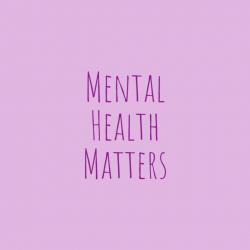Written by: Vicki Snow MBACP, BA (Hons) Integrative Counsellor and Psychotherapist
It is essential to make time for our mental health and find resources to help manage our emotions and prioritise looking after ourselves on a day-to-day basis. Here’s a reminder of some simple things you can do that are proven to help.
Exercise
It has long been recognised that physical exercise can significantly boost both physical and mental health, releasing endorphins which can alleviate anxiety and stress.
- Incorporate exercise into your daily routine – walking, running, cycling, yoga – anything that gets you moving.
- Try and choose something that you enjoy so that you are more likely to stick with it.
- Find a friend you can exercise with so you can encourage each other.
- If you haven’t exercised for a while, build it up slowly – even a brisk 10-minute walk is better than nothing.
Nature
Being in touch with nature has been shown to improve mental wellbeing and reduce feelings of stress or anger.
- Try growing flowers, vegetables or herbs. Even if you don’t have much outdoor space, a balcony or windowsill will do, or you could invest in some indoor plants.
- Spend time in the park or green outdoor spaces where you can escape and enjoy the sights and sounds of nature.
- Arrange to walk and talk with a friend or family member as often as you can.
- Ecotherapy has been found to help with mental health issues. It offers treatment through doing activities outside in natural light. See the following for more details. https://www.mind.org.uk/information-support/tips-for-everyday-living/nature-and-mental-health/how-nature-benefits-mental-health/
Breathing
Slowing down your breath is one of the best ways to lower stress levels in the body. It sends a message to the brain to calm the nervous system, lowers the heart rate and blood pressure and promotes relaxation by reducing the levels of stress hormones. There are a number of apps (e.g. Calm and Headspace) and websites that will guide you through different breathing exercises.
- Find 5 or 10 minutes a day to focus on your breathing.
- Start by noticing your breath and then begin to lengthen each breath and slow it down.
- You can also practice using the words: “Breathe in calm, breathe out tension”.
- For more details have a look at: https://www.medicalnewstoday.com/articles/diaphragmatic-breathing
Mindfulness
Focus on the here and now to help stop ruminating thoughts and anxiety. When practiced regularly, this exercise of noticing our thoughts and emotions and letting them pass without judgement can help us become fully present rather than running on autopilot. It can give us time and space to choose how we respond rather than instinctively reacting the way we always have. It allows us to gain some distance from thoughts and feelings which can sometimes feel as though they are in control of us and our lives.
- Begin to notice a thought, feeling or sensation as it arises.
- Observe it with curiosity, kindness and a non-judgemental attitude.
- Keep returning to the present moment each time your thoughts wander. (You can return to your thoughts at a later time).
- Focus on your breath to help ‘anchor’ you in the moment.
Positive Attitude
Just because we think something doesn’t make it real. But thoughts can be powerful and have an impact on how we feel. If we continually tell ourselves that everything always goes wrong and that we can’t do it, then the chances are they will go wrong, and we will end up in a negative spiral. Conversely, having a positive outlook can dramatically improve your levels of optimism, relationships, productivity and energy levels.
- Actively try and smile and tell yourself you are confident, content and calm.
- Begin to change your mindset and pay attention to the good rather than the bad.
- Note down three new things you are grateful for every day.
- Start the day with optimism and try and incorporate some things to look forward to several times a week.
Compassion
Be kind to yourself. Often it is not so much a difficult situation or feeling that causes us pain or anxiety, but the negative judgement that goes with it. We tell ourselves we shouldn’t have said/done that, or that we should have known better or that we are stupid, lazy, pathetic.
- Try and keep things in perspective and remember that we all have bad days.
- When you notice your inner critic finding fault, examine whether it is as bad as you think and look for things that went well or what you could learn from the experience.
- Take a few minutes each day to appreciate yourself – life can be hard, particularly now and you are good enough.
- Act as if you are your own best friend and be a comfort not a critic.
Stay Connected
Humans are social beings. Lockdown has shown us how crucial it is to maintain connections with friends and family.
- Make time regularly for meeting friends.
- If you can’t meet in person, speak on the phone or on-line to friends and family.
- Focus on relationships with people who make you feel good and who you can laugh with.
- This talk illustrates why our relationships with others matter and how they can predict our happiness and increase our potential. https://www.youtube.com/watch?v=iwhi3dE12MI
Ask for Help
If you are struggling with low mood, anxiety, depression or any other issue related to your mental health, talk to your GP, a psychotherapist or psychologist. Our team is happy to help, please call reception, for more information about our psychological services team https://www.whitehartclinic.co.uk/treatments/psychological-services
Our Barnes Clinic
Our clinic is located in Barnes, South-West London and is easily accessible by public transport.
For more information including parking and other practicalities see our Barnes clinic page
Book an Appointment
Booking an appointment with one of our therapists is quick and easy. There is no long waiting time and you don’t need a referral from your GP.


